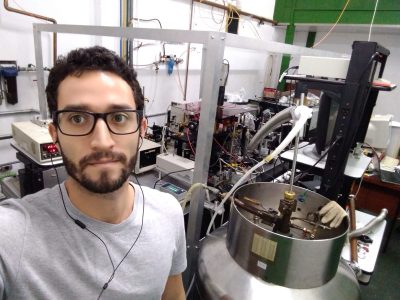
At the beginning of 2020, Bruno César da Silva was very excited. After six months of participating in an international selection process, he had obtained a position as a temporary researcher at a research institute in the city of Grenoble (France). Paid by the French government, he would commit to studying in detail the properties of semiconductor nanowires and some of their possible applications. In fact, these tiny wires may be used in future electronic and optoelectronic devices, but, for that, they need to be better understood and controlled.
In his master’s and doctorate in Physics, carried out at UNICAMP, Bruno had studied semiconductor nanowires, always under the guidance of excellent professors, and he had acquired solid knowledge in the set of techniques required by the post. “Finding someone who has a background in all the topics the job asked for is difficult, but I was lucky, was willing and had the opportunity to gain experience in all these areas,” says Bruno. In addition, Bruno is the main author of two articles published in renowned scientific journals (Nano Letters and Scientific Reports). Despite not having an expressive number of articles, Bruno’s production, generated during his doctorate, drew attention for its quality.
But Bruno’s training in scientific research started in high school, within the Junior Scientific Initiation Program of CNPq (the main federal research agency in Brazil). He then continued his undergraduate studies in Physics at the University of Lavras, where he undertook undergraduate research as a fellow of FAPEMIG (the research foundation in Minas Gerais State). While still an undergraduate student, Bruno had his first international research experience, at a Spanish university, as a fellow of the Science without Borders Program, from the Brazilian government. “My training is the result of public policies and investments,” says Bruno. In fact, at all stages, Bruno had scholarships financed with public resources. He started with less than 100 reais in high school and reached about 3,600 reais at the end of his doctorate with a scholarship from FAPESP, the São Paulo State research foundation.
Sudden change of plans
Bruno had a flight ticket and accommodations booked to begin his life in Grenoble when in mid-March the WHO declared the Covid-19 pandemic. As a result, hiring at the research institute was suspended, and Bruno started looking for other opportunities.
He searched in Brazil and abroad. He sought postdoctoral fellowships and jobs as a researcher or data scientist – a professional area linked to mathematics and computing.
Without opportunities and no income, Bruno, aged 32, returned to his parents’ home in Jacareí (SP). He requested emergency government assistance and pledged to finalize scientific articles based on the doctoral results, while taking online courses to redirect his career.
Finally, six months after the scheduled date, Bruno took on his temporary position at the French research institute. And he has been working with nanowires for over a month, very happy. “Here, we, the newly graduated doctors, are treated like professionals, and we pay taxes like any worker,” he jokes, making an implicit comparison with the situation that young PhD grant holders experience in Brazil.
After his experience in Grenoble, he plans to participate in a selection process to become a research professor at a Brazilian university. However, Bruno says that if the situation of scarce resources for science continues in Brazil, he will continue to build a career abroad. “I think it is important to return the investment in my education to the Brazilian society through teaching and conducting research that can contribute to the development of my country. We are able to do quality science in Brazil, but we need the necessary conditions,” he concludes.
